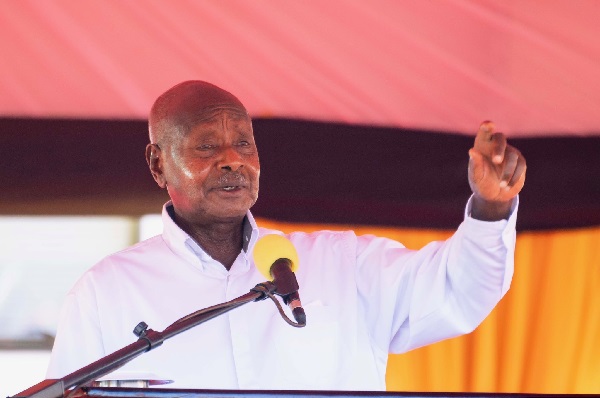REPORT: Global growth is stabilizing but at a weak level

Museveni at Kololo. He said for Uganda’s economy to grow further, we need to be competitive
SPECIAL REPORT | THE INDEPENDENT | The global economy is expected to stabilize for the first time in three years in 2024—but at a level that is weak by recent historical standards, according to the World Bank’s latest Global Economic Prospects report.
Global Economic Prospects report released this week said global growth is projected to hold steady at 2.6% in 2024 before edging up to an average of 2.7% in 2025-26. That is well below the 3.1% average in the decade before COVID-19.
The forecast implies that for 2024-26 countries that collectively account for more than 80% of the world’s population and global GDP would still be growing more slowly than they did in the decade before COVID-19.
Overall, developing economies are projected to grow 4% on average over 2024-25, slightly slower than in 2023.
Growth in low-income economies is expected to accelerate to 5% in 2024 from 3.8% in 2023. However, the forecasts for 2024 growth reflect downgrades in three out of every four low-income economies since January.
In advanced economies, growth is set to remain steady at 1.5% in 2024 before rising to 1.7% in 2025. The World Bank Group’s Chief Economist and Senior Vice President, Indermit Gill said four years after the upheavals caused by the pandemic, conflicts, inflation, and monetary tightening, it appears that global economic growth is steadying.
He however said growth is at lower levels than before 2020 and that prospects for the world’s poorest economies are even more worrisome.
“They face punishing levels of debt service, constricting trade possibilities, and costly climate events. Developing economies will have to find ways to encourage private investment, reduce public debt, and improve education, health, and basic infrastructure.
The poorest among them—especially the 75 countries eligible for concessional assistance from the International Development Association—will not be able to do this without international support.” Said Indermit Gill.
The World Bank’s Global Economic Prospects report is published twice a year. In January 2024, the report painted a grim picture saying the world faced the weakest growth in 30 years.
The report says there are positive and negative signals depending on which part of the world the economy is located.
Ayhan Kose, the World Bank’s Deputy Chief Economist and Director of the Prospects Group says the good news for most economies including Uganda is that the global economy is stabilizing.
He however says there are significant global challenges for emerging and developing economies. Generally, growth is stabilizing at an average of 2.6 of the GDP compared to the average growth before the COVID-19 pandemic of 3.1 percent.
Global inflation is expected to moderate to 3.5% in 2024 and 2.9% in 2025, but the pace of decline is slower than was projected just six months ago.
Many central banks, as a result, are expected to remain cautious in lowering policy interest rates. Global interest rates are likely to remain high by the standards of recent decades—averaging about 4% over 2025-26, roughly double the 2000-19 average.
“Although food and energy prices have moderated across the world, core inflation remains relatively high—and could stay that way,”said Ayhan Kose, the World Bank’s Deputy Chief Economist and Director of the Prospects Group.
“That could prompt central banks in major advanced economies to delay interest-rate cuts. An environment of ‘higher-for-longer’ rates would mean tighter global financial conditions and much weaker growth in developing economies.”
The latest findings seem to tally with the projections by the Ministry of Finance as reflected in the 2024/2025 budget. The report forecasts Uganda’s economy to grow during the fiscal year 2024 at 6%, 2025 at 6.2%, and 6.6% in the fiscal year 2026.
It however notes the projections presented may differ from those contained in other World Bank documents, even if basic assessments of a country’s prospects do not significantly differ at any given moment in time.
Finance Minister, Matia Kasaija told Parliament on Thursday that Uganda’s economic outlook is optimistic. He said the economy has remained resilient and has fully recovered from a myriad of internal and external shocks promising that next financial year, the economy is projected to get back to Uganda’s steady-state growth potential of between 6.4 and 7 percent, and double digit over the next five years.
According to the Minister, it is projected that next Financial Year, 2024/25, Uganda’s GDP will further expand to Shs 225.5 trillion (equivalent to USD 60 billion).
He said those numbers exclude the anticipated oil and gas revenues as well as the planned interventions to grow the economy tenfold.
Kasaija, now the longest serving fiancé Minister under President Museveni however mentioned some risk factors like regional and global geopolitics and climate change
At Sub Saharan Africa, level the World Bank report said the downside risks include increasing global geopolitical tensions, especially an escalation of the conflict in the Middle East.
It said a further deterioration in regional political stability; increased frequency and intensity of adverse weather events; higher-than-expected inflation; a sharper-than-expected economic slowdown in China; and increased government debt distress, especially if elevated public debt cannot be stabilized or new sources of financing do not become available.
Consumer price inflation could prove to be stickier than expected or pick up again driven, for example, by food price inflation caused by supply disruptions, possibly triggered by an escalation of the conflict in the Middle East.
From President Museveni’s perspective, the economy is likely to grow more with the generation of electricity, and with a relatively well-educated population. Museveni said this growth should be stimulated by the private sector which he described as the main engine for growth. Nevertheless, he said the country needs to be more competitive.
The latest Global Economic Prospects report also features two analytical chapters of topical importance. The first outlines how public investment can be used to accelerate private investment and promote economic growth.
It finds that public investment growth in developing economies has halved since the global financial crisis, dropping to an annual average of 5% in the past decade. Yet public investment can be a powerful policy lever. For developing economies with ample fiscal space and efficient government spending practices, scaling up public investment by 1% of GDP can increase the level of output by up to 1.6% over the medium term.
The second analytical chapter explores why small states—those with a population of around 1.5 million or less—suffer chronic fiscal difficulties. Two-fifths of the 35 developing economies that are small states are at high risk of debt distress or already in it.
That’s roughly twice the share for other developing economies. Comprehensive reforms are needed to address the fiscal challenges of small states.
Revenues could be drawn from a more stable and secure tax base. Spending efficiency could be improved —especially in health, education, and infrastructure. Fiscal frameworks could be adopted to manage the higher frequency of natural disasters and other shocks. Targeted and coordinated global policies can also help put these countries on a more sustainable fiscal path.
****
URN
The post REPORT: Global growth is stabilizing but at a weak level appeared first on The Independent Uganda:.



